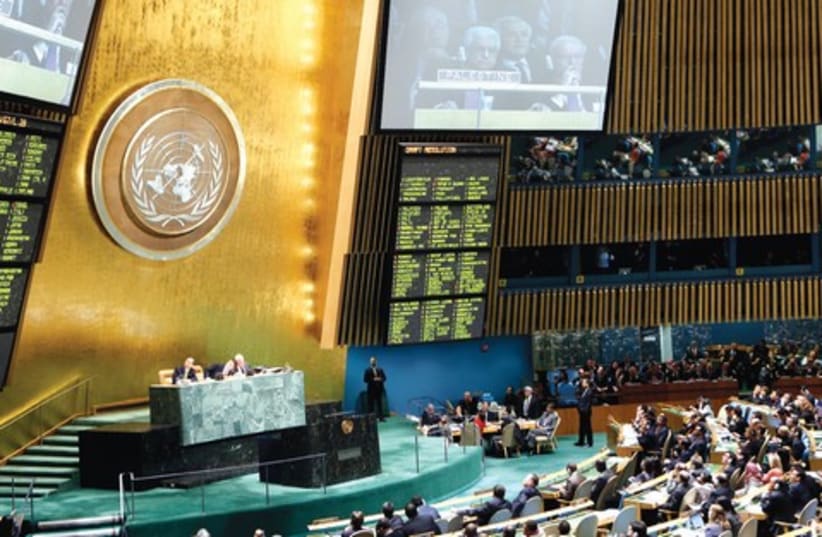Palestine is a country under occupation. What Norway, Finland, Holland, France, Korea, Philippines were between 1939 and 1945 - nation states under occupation. Today, the state of Palestine is officially a state under occupation. It has 192 member countries that recognize this, and a nation state, Israel, which is the occupying power; These are the new realities.
The comparison is of course, totally farcical. Comparing countries that have existed for centuries to a state that has never existed, and further claiming statehood in an area it has never controlled is preposterous to say the least.Certainly the “192 member countries"- presumably belonging to the UN - are not acknowledging Erekat's outrageous statement. These countries are being dragged into a political madness which increasingly appears to be nothing more than another manifestation of the Fatah-Hamas rivalry for control of the hearts and minds of the Palestinians.However, 50 of said countries resisted being dragged asunder, with 9 rejecting and 41 abstaining from supporting the General Assembly Resolution granting Palestine the status of a non-member observer state.Before embarking on their latest flight into disillusion, Abbas and Erekat should have heeded the explanations given by Singapore and Germany for abstaining. The UN Department of Public Information News and Media Division summarized Germany’s rejection as follows:The delegate of Germany said his nation firmed believed in “two states for two peoples” and shared the goal of a Palestinian State. However, such status must be achieved only through direct negotiations. There was doubt that today’s action would not be helpful for the peace process at this point in time. “It might lead to further hardening of positions instead of improving chances of a two-State solution through direct negotiations,” he said. He explicitly welcomed that today’s resolution called for a two-state solution and, hence, recognized the right of Israel to exist in peace. However, Israel’s legitimate security concern had to be addressed in a credible manner.
Singapore was even more circumspect in its sober assessment made against the baying cries from those 138 states who could not see the wood for the trees.The representative of Singapore said that his delegation supported the right of the Palestinian people to a homeland and had, in the past, supported relevant Assembly resolutions. However, his country had abstained from today’s vote because only a negotiated settlement, consistent with Security Council resolution 242 (1967), could provide the basis for a viable, long-term solution. Both sides had legitimate rights and shared responsibilities and must be prepared to make compromises to achieve the larger good of a lasting peace. Because of those interlinked rights and responsibilities, no unilateral move could result in a just and durable outcome.
The readiness of many democratic states to vote in favor of November 29’s resolution and at the same time abandon Resolution 242 - the only internationally accepted United Nations resolution binding both Israelis and Arabs to ending their conflict - is shameful.Those democracies must now rue the day when their votes will be interpreted as abetting the state of utter confusion that exists following Abbas's most recent “Presidential Decree.”Let’s turn now to Israel and its upcoming elections: A new political party, Bayit Yehudi, has joined the fray, and could end up with a controlling vote in the next parliament.Its leader, Naftali Bennett, has expressed his call for Israel to annex at least 60 percent of the West Bank. In an interview with Haaretz on 28 December, he said:In the end, Jordan will be Palestine. There is no chance that, between the river and the sea, a Palestinian state will arise. The two-state solution is dead. There is no need to bury the two-state solution because it is already buried.
And due to his inane decree consigning the PA to the dustbin of history, Abbas might just have assisted in advancing Bennett’s prediction. Ave atque vale to the Palestinian Authority. Others less charitable might simply say, "good riddance."
